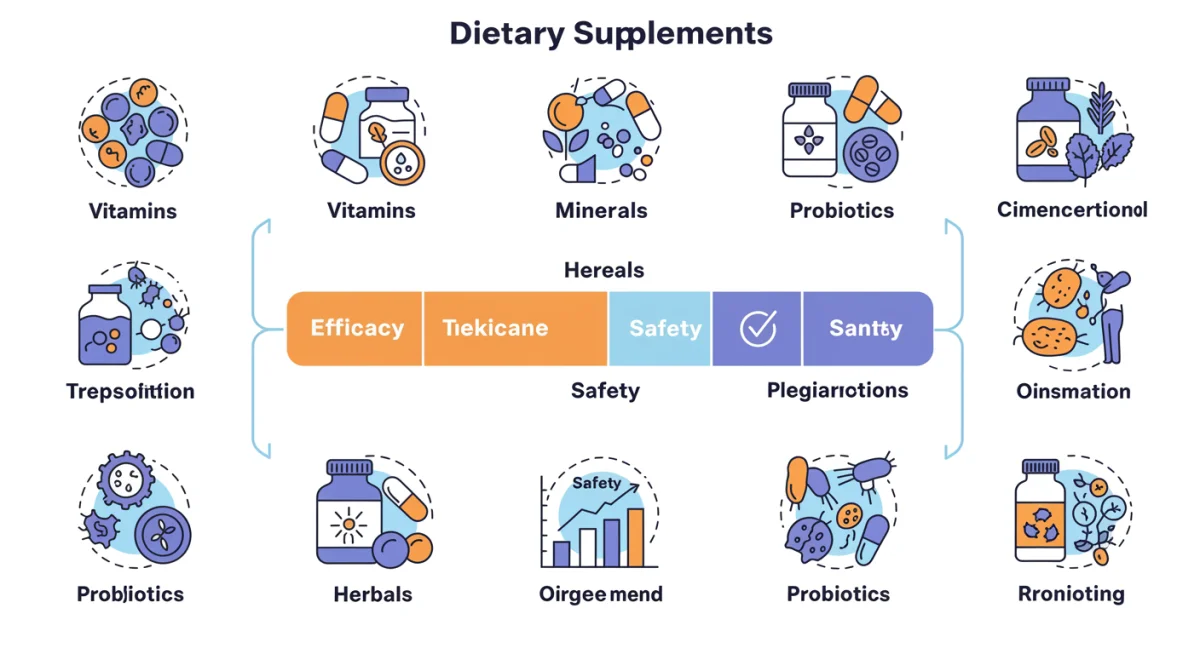Dietary Supplements: 2025 Efficacy & Safety Review

This 2025 review of dietary supplements in the US examines the current landscape of efficacy and safety for common options, providing crucial insights for informed consumer decisions.
In an age where personal health is paramount, the market for dietary supplements continues to expand, promising everything from enhanced energy to improved immunity. But what is the real story behind these readily available products? This comprehensive dietary supplement review 2025 aims to cut through the marketing hype, providing an evidence-based look at the efficacy and safety of common options available in the US today.
Understanding the Dietary Supplement Landscape in 2025
The dietary supplement industry has seen significant growth, driven by increasing consumer interest in proactive health management. However, this expansion also brings challenges, particularly concerning product regulation and consumer education. Navigating this vast market requires a clear understanding of what supplements are, how they are regulated, and what to realistically expect from them.
In the US, dietary supplements are regulated by the Food and Drug Administration (FDA) under the Dietary Supplement Health and Education Act (DSHEA) of 1994. Unlike prescription drugs, supplements do not undergo pre-market approval for safety or efficacy. This distinction is crucial for consumers to grasp, as it places a greater burden on individuals to research products thoroughly.
Regulatory Framework and Consumer Protection
The FDA’s role primarily focuses on post-market surveillance. This means they can take action against unsafe supplements after they are on the market, or against manufacturers making false claims. However, this reactive approach highlights the importance of consumer vigilance.
- No Pre-Market Approval: Manufacturers are responsible for ensuring their products are safe and that their claims are truthful and not misleading.
- Good Manufacturing Practices (GMPs): The FDA establishes GMPs to ensure supplements are produced consistently and meet quality standards.
- Adverse Event Reporting: Consumers and healthcare professionals can report adverse effects to the FDA, which helps identify potential safety issues.
Understanding these regulatory nuances is the first step towards making informed decisions about dietary supplements. It underscores the need for consumers to be proactive, critically evaluating product claims and seeking reliable information.
The landscape of dietary supplements in 2025 is dynamic, with new products constantly emerging. While the promise of improved health is enticing, a discerning approach, grounded in an understanding of current regulations and scientific evidence, is essential for safe and effective use.
Vitamins and Minerals: Essential Nutrients and Common Deficiencies
Vitamins and minerals are foundational to human health, playing critical roles in countless bodily functions. While a balanced diet should ideally provide all necessary nutrients, modern lifestyles and dietary habits can sometimes lead to deficiencies, making supplementation a consideration for some individuals.
Common deficiencies in the US include Vitamin D, B12, iron, and calcium. These deficiencies can arise from various factors, such as limited sun exposure, vegetarian or vegan diets, specific medical conditions, or simply inadequate intake through food.
Key Vitamins and Their 2025 Status
Vitamin D remains a focal point due to its widespread deficiency and crucial role in bone health, immune function, and mood regulation. Research in 2025 continues to explore its broader implications for chronic disease prevention.
- Vitamin D: Essential for bone health and immune support. Many adults are deficient, especially in regions with less sunlight.
- Vitamin B12: Crucial for nerve function and red blood cell formation, often a concern for vegans and older adults.
- Vitamin C: Known for its immune-boosting properties, though severe deficiency is less common in developed nations.
For individuals with confirmed deficiencies, supplementation can be highly effective. However, indiscriminate high-dose supplementation without a medical basis can sometimes lead to adverse effects.
Minerals like iron, calcium, and magnesium are also frequently discussed. Iron deficiency, particularly in women of childbearing age, can lead to anemia. Calcium is vital for bone density, especially important for preventing osteoporosis. Magnesium plays a role in muscle and nerve function, blood sugar control, and blood pressure regulation.
The efficacy of vitamin and mineral supplements is generally well-established for treating or preventing specific deficiencies. However, for those without deficiencies, the benefits of routine supplementation are often less clear and remain an active area of research in 2025. Consulting a healthcare professional to assess individual needs and potential deficiencies is always recommended.
Herbal Supplements: Ancient Remedies in a Modern Context
Herbal supplements, derived from plants, have been used for centuries in traditional medicine systems. Today, they represent a significant portion of the dietary supplement market, with consumers seeking natural alternatives for various health concerns. However, their efficacy and safety profiles can be complex, often requiring more nuanced understanding than synthetic vitamins.
Popular herbal supplements include St. John’s Wort for mood, turmeric for inflammation, and echinacea for immune support. While some herbs have a long history of traditional use and preliminary scientific backing, rigorous clinical trials are often lacking compared to pharmaceutical drugs.
Evaluating Efficacy and Safety of Herbals
The effectiveness of herbal supplements can vary widely due to factors like plant species, growing conditions, harvesting methods, and extraction processes. Standardization of active compounds is a continuous challenge in the industry.
For example, turmeric, specifically its active compound curcumin, has been studied for its anti-inflammatory and antioxidant properties. While promising, the bioavailability of curcumin is naturally low, leading to the development of formulations designed to enhance absorption.
- Ginkgo Biloba: Often used for cognitive function, though research on its benefits for memory in healthy individuals is mixed.
- St. John’s Wort: Studied for mild to moderate depression, but known for significant interactions with various medications.
- Echinacea: Popular for cold and flu prevention, with some studies suggesting a modest benefit.
Safety is another critical consideration for herbal supplements. Natural does not always mean safe. Herbals can interact with prescription medications, exacerbate existing health conditions, or cause allergic reactions. The lack of stringent pre-market testing means that potential adverse effects may only become apparent after widespread use.
Consumers should exercise caution, particularly when combining herbal supplements with medications or if they have underlying health issues. Reputable third-party testing for purity and potency can offer some assurance, but direct medical advice remains paramount.
Probiotics and Prebiotics: Gut Health Revolution
The focus on gut health has exploded in recent years, with probiotics and prebiotics taking center stage. These supplements aim to support a healthy gut microbiome, which is increasingly recognized as vital for digestion, immunity, and even mental well-being. Understanding the distinct roles of probiotics and prebiotics is key to their effective use.
Probiotics are live microorganisms, typically bacteria, that are beneficial to health when consumed in adequate amounts. Prebiotics, on the other hand, are non-digestible food ingredients that selectively stimulate the growth and activity of beneficial bacteria in the colon.
The Science Behind Gut Health Supplements
The efficacy of probiotics is highly strain-specific, meaning that the benefits observed for one strain may not apply to another. Different strains may target different health conditions, from irritable bowel syndrome (IBS) to antibiotic-associated diarrhea.

Research in 2025 continues to refine our understanding of which strains are most effective for specific conditions. For instance, certain Lactobacillus and Bifidobacterium strains have shown promise for digestive health.
- Probiotics for IBS: Certain strains can help alleviate symptoms like bloating and abdominal pain.
- Antibiotic-Associated Diarrhea: Probiotics are often recommended to restore gut flora disrupted by antibiotics.
- Immune Support: A healthy gut microbiome is linked to a robust immune system.
Prebiotics, such as inulin and fructooligosaccharides (FOS), are found naturally in foods like garlic, onions, bananas, and asparagus. Supplementation provides a concentrated dose to feed beneficial gut bacteria, promoting their growth and enhancing their positive effects.
While generally considered safe, some individuals may experience mild digestive discomfort, such as gas or bloating, when first introducing probiotics or prebiotics. It’s advisable to start with lower doses and gradually increase them. The long-term effects and optimal dosages for various health conditions are still active areas of investigation, making personalized advice from a healthcare provider valuable.
Specialty Supplements: From Omega-3s to Collagen
Beyond basic vitamins, minerals, and herbals, the market is rich with specialty supplements designed to address specific health goals. These often include compounds like omega-3 fatty acids, collagen, glucosamine, and melatonin, each with targeted applications and varying levels of scientific support.
Omega-3 fatty acids, typically derived from fish oil, are widely recognized for their benefits to heart health, brain function, and inflammation reduction. Collagen, gaining popularity for skin, hair, and joint health, is a structural protein found abundantly in the body.
Evaluating Niche Health Solutions
The efficacy of omega-3 supplements, particularly EPA and DHA, is well-supported by extensive research, especially concerning cardiovascular health. They are often recommended for individuals who don’t consume enough fatty fish.
- Omega-3s: Benefits include reducing triglycerides, supporting brain health, and anti-inflammatory effects.
- Collagen: Some studies suggest benefits for skin elasticity, hydration, and joint pain reduction.
- Glucosamine & Chondroitin: Popular for joint health, with mixed results in research, showing modest benefits for some with osteoarthritis.
Collagen supplementation, while popular, has a more evolving body of evidence. Studies suggest it can improve skin hydration and elasticity and potentially reduce joint pain. However, the exact mechanisms and optimal forms of collagen are still under investigation.
Glucosamine and chondroitin, often taken together for osteoarthritis, have shown modest benefits for pain relief and improved joint function in some individuals, but not all studies agree on their effectiveness. Melatonin, a hormone that regulates sleep, is a popular choice for sleep disturbances, with clear efficacy for short-term use in certain sleep disorders, but long-term effects require more research.
As with all supplements, quality and purity are paramount. For specialty supplements, seeking products that have undergone third-party testing can help ensure they contain the stated ingredients without harmful contaminants. Consulting a healthcare professional is crucial to determine if these specialized options align with individual health needs and to avoid potential interactions.
Safety Concerns and Potential Interactions
While dietary supplements are often perceived as harmless due due to their natural origins or over-the-counter availability, they are not without risks. Safety concerns range from contamination and mislabeling to adverse effects and dangerous interactions with medications or existing health conditions. Understanding these risks is fundamental to responsible supplement use.
One primary concern is the lack of stringent pre-market approval. This means that a supplement could be sold to consumers before its safety profile is fully understood, particularly for new ingredients or combinations.
Navigating Risks and Ensuring Safe Use
Adulteration and contamination are ongoing issues in the supplement industry. Products can be tainted with undeclared prescription drugs, heavy metals, pesticides, or other harmful substances. This is particularly prevalent in weight loss, sexual enhancement, and athletic performance supplements.

Drug-supplement interactions are another significant safety concern. Many herbal supplements, such as St. John’s Wort, can alter the metabolism of prescription medications, rendering them less effective or increasing their toxicity. For example, St. John’s Wort can reduce the effectiveness of oral contraceptives, anticoagulants, and certain antidepressants.
- St. John’s Wort: Interacts with numerous medications, including antidepressants, birth control, and blood thinners.
- Ginseng: Can affect blood sugar levels and interact with anticoagulants.
- Vitamin K: Can interfere with the action of blood-thinning medications like warfarin.
Furthermore, taking excessive doses of certain vitamins and minerals can lead to toxicity. For instance, very high doses of Vitamin A can cause liver damage, and excessive iron can be toxic, especially in children. Pregnant women, children, and individuals with chronic diseases should be particularly cautious and always consult a healthcare provider before taking any supplements.
To mitigate these risks, consumers should prioritize products from reputable brands that undergo third-party testing (e.g., NSF International, USP, ConsumerLab.com). It is also vital to disclose all supplement use to healthcare providers to prevent potential drug interactions and ensure overall safety. The mantra ‘more is not always better’ holds true for supplements, emphasizing the importance of informed and moderated use.
Making Informed Choices: A Consumer’s Guide for 2025
Navigating the complex world of dietary supplements requires a strategic and informed approach. With countless products vying for attention, making choices that genuinely support your health goals while minimizing risks can feel daunting. This guide offers practical steps for consumers in 2025 to make educated decisions about supplement use.
The first and most crucial step is to assess your actual needs. Are you experiencing symptoms of a deficiency? Do you have specific health goals that might be supported by a supplement? Often, a balanced diet and healthy lifestyle habits are the most effective foundations for wellness.
Practical Tips for Supplement Selection
Before reaching for a supplement, consider consulting a healthcare professional, such as a doctor or a registered dietitian. They can help identify any nutritional gaps, assess potential interactions with medications, and provide personalized recommendations based on your health status.
- Consult a Healthcare Professional: Get personalized advice based on your health history and current medications.
- Research Ingredients and Claims: Look for scientific evidence supporting the efficacy and safety of the specific ingredients. Be wary of exaggerated claims.
- Check for Third-Party Certification: Look for seals from organizations like USP, NSF International, or ConsumerLab.com, which verify product quality and purity.
When evaluating products, pay close attention to the label. Understand the active ingredients, their dosages, and any potential allergens. Be skeptical of products that promise quick fixes or miraculous results, as these are often red flags for unproven or unsafe formulations.
Finally, remember that supplements are meant to supplement, not replace, a healthy diet. They can be valuable tools for addressing specific nutritional gaps or supporting certain health conditions, but they are not a substitute for whole foods or professional medical care. By adopting a critical and informed perspective, consumers can harness the potential benefits of supplements while safeguarding their health in 2025.
| Key Point | Brief Description |
|---|---|
| Regulatory Gaps | Supplements lack pre-market FDA approval, requiring consumer diligence. |
| Efficacy Varies | Benefits differ greatly by supplement type and individual needs; evidence is key. |
| Safety Concerns | Risks include contamination, adverse effects, and drug interactions. |
| Informed Choices | Consult professionals, research, and seek third-party certified products. |
Frequently Asked Questions About Dietary Supplements
No, dietary supplements are not necessary for everyone. A well-balanced diet typically provides most essential nutrients. Supplements are generally recommended for individuals with specific deficiencies, dietary restrictions, or certain health conditions, always under the guidance of a healthcare professional.
Look for third-party certifications (e.g., USP, NSF International) on product labels, which indicate independent testing for purity and potency. Research the ingredients and claims, ensuring they are backed by scientific evidence. Always consult a healthcare provider before starting any new supplement.
Yes, many dietary supplements, especially herbal ones, can interact significantly with prescription and over-the-counter medications. These interactions can reduce medication effectiveness or increase adverse effects. Always inform your doctor or pharmacist about all supplements you are taking.
The FDA regulates dietary supplements under DSHEA but does not approve them before they are marketed. Their role is primarily post-market, meaning they can intervene if a product is found to be unsafe or if false claims are made. Manufacturers are responsible for product safety.
Not necessarily. The term ‘natural’ does not guarantee safety. Natural substances can still be potent, cause side effects, or interact with medications. Purity, dosage, and individual health status are more critical factors than whether an ingredient is natural or synthetic.
Conclusion
The world of dietary supplements in 2025 is characterized by both immense potential and significant complexity. While these products can play a valuable role in bridging nutritional gaps and supporting specific health objectives, a critical and informed approach is paramount. Consumers must navigate a landscape where regulatory oversight differs significantly from pharmaceuticals, placing a greater emphasis on personal research, reputable sourcing, and professional guidance. By understanding the nuances of efficacy, recognizing potential safety concerns, and prioritizing evidence-based decisions, individuals can make truly informed choices that contribute positively to their overall health and well-being. Ultimately, dietary supplements should be viewed as complementary tools within a broader strategy of healthy eating and lifestyle, always in consultation with trusted healthcare providers.





